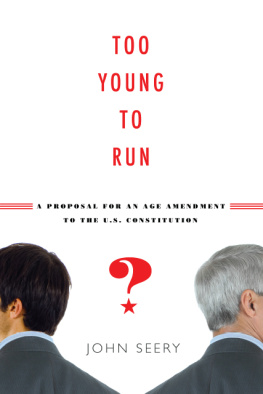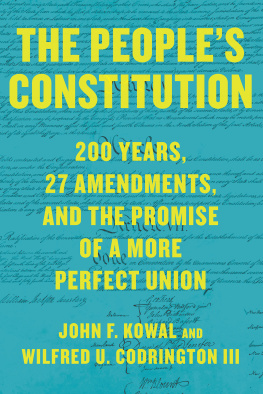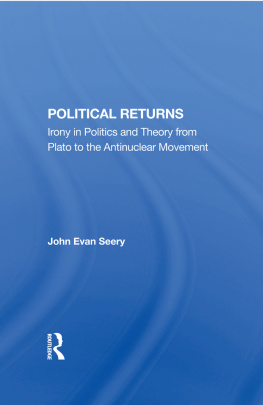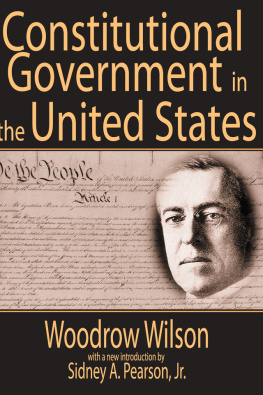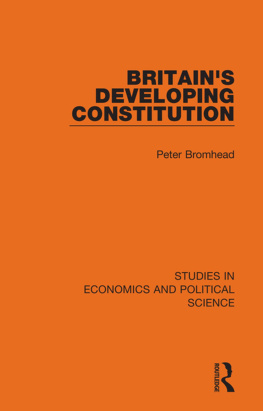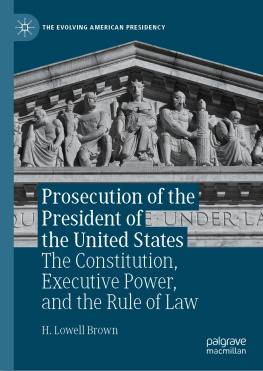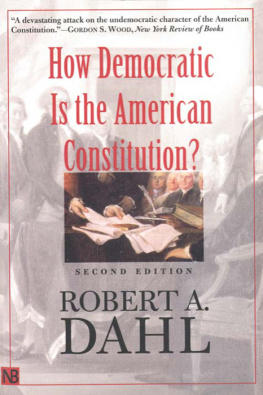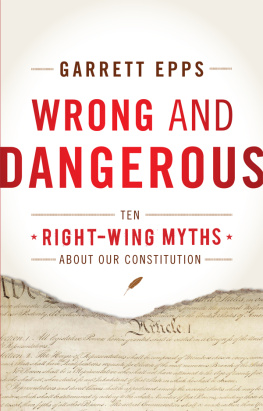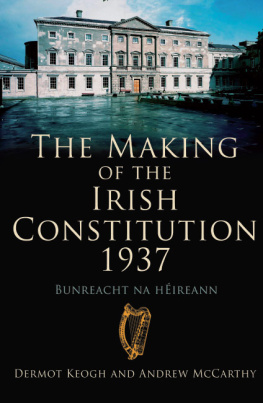Too Young to Run?
Revolution 1968 Sony/ATV Music Publishing LLC.
All rights administered by Sony/ATV Music Publishing LLC,
8 Music Square West, Nashville, TN 37203. All rights reserved.
Used by permission.
Library of Congress
Cataloging-in-Publication Data
Seery, John Evan.
Too young to run? : a proposal for an age amendment to the U.S. Constitution / John Seery.
p. cm.
Includes bibliographical references and index.
Summary: Examines the history, theory, and politics behind the age qualifications for elected federal office in the United States Constitution. Argues that the right to run for office ought to be extended to all adult-age citizens who are otherwise office-eligibleProvided by publisher.
ISBN 978-0-271-04853-6 (cloth : alk. paper)
1. Nominations for officeUnited States.
2. United States. Constitution.
I. Title.
JK2063.s44 2011
342.73'055dc22 2010046445
Copyright 2011
The Pennsylvania State University
All rights reserved
Printed in the United States of America
Published by
The Pennsylvania State University Press,
University Park, PA 16802-1003
The Pennsylvania State University Press
is a member of the
Association of American University Presses.
It is the policy of The Pennsylvania State University Press to use acid-free paper. Publications on uncoated stock satisfy the minimum requirements of American National Standard for Information SciencesPermanence of Paper for Printed Library Material, ANSI Z39.481992.
This book is printed on Natures Natural, which contains 50% post-consumer waste.
In memory of
Francis Thomas Seery
CONTENTS
Pursuing this unwonted topic has not been as lonely as one might suppose. Ive received a great deal of help and encouragement along the way, for which I am inordinately grateful. I want to thank publicly such friends and colleagues, while emphasizing that they bear absolutely no responsibility for any errors that remain. Shortcomings that follow are mine alone. First, Sanford Thatcher and Sanford Levinson quietly assisted me in this project even when it needed still more time and work. One desperately needs such background supporters, and I hope that I havent betrayed their early trust. Many colleagues read drafts of various portions at various stages of this undertaking, and they provided crucial editorial feedback and criticism. I thank them all in one sweep here, which I regret doesnt do justice to the care, rigor, and attention to detail they extended so graciously to me: Derek Barker, Robert W. Bennett, Aaron Bruhl, Samuel Chambers, Justin Crowe, Patrick Deneen, Derek Galey, William Galston, Jennifer Hochschild, Dallas Holmes, Alexander Jakle, Bronwyn Leebaw, Andrew B. Lewis, Lee McDonald, Susan McWilliams, Paul Seaton, Simon Stow, Tracy Strong, and several anonymous reviewers (one especially to whom I owe an unspeakable debt). At timely junctures, a number of individuals offered me key insights or telling leads or wise counsel or bits of consolation, to the extent that I feel compelled to announce here that I well remember their specific contributions and want to express my abiding appreciation: Gordon Babst, Judith Baer, Terrell Carver, Daniel Conway, Jack DiStefano, Kelly Douglass, Elisabeth Ellis, Richard Flathman, Leo Flynn, Farah Godrej, Bonnie Honig, Bill Katovsky, Joseph Knippenberg, Henry Krips, Cary Nederman, Jake Oken-Berg, Michael Owen, Kim Peasley, Boris Ricks, Stephanie Simon, Sharon Snowiss, Jacqueline Stevens, James Sullivan, Greg Ver Steeg, and the late David Foster Wallace. I thank Arianna Huffington for providing me with a regular forum for several years in which I could try to extend some ideas outside the classroom. Last but not less, a number of my undergraduate students at Pomona College, and at some other colleges, influenced the direction of the manuscript in decided ways, and I am very pleased to acknowledge their thoughtful contributions here: Sara Aceves, Laura Aylward, Genna Beier, Galen Benshoof, Zachary Berne, Trevor Bisset, Diego Bustamante, Lauren Calton, Gregory Carter, Jemel Derbali, Allison Don, Keegen Dresow, Martie Finkelstein, Erin Fitts, Caroline Fleetwood, Kevin Frick, Daniel Garrett-Steinman, Jediah Grobstein, Brian Hardesty, Benjamin Heidlage, Sheri Irvin, Brandon Jacobsen, Yael Japha, Danielle Joseph, Matthew Kelberg, Sara Kendall, Jessie Lewis, Jordan Liew, Zachary Mandelblatt, Katie McDonald, Alanna Mori, Rory OSullivan, Meredith Pressfield, Maya Prokupets, Laura Samuels, Jonathan Singer, Susan Sparrow, Marlies Talay, Ingrid Vidal, Michelle Yu, and Jonathan Zelig.
The destiny of any nation, at any given time, depends on the opinions of its young persons under twenty-five.
Goethe
Forty-seven-year-old Barack Obama won the 2008 U.S. presidential election against seventy-two-year-old John McCain, and several commentators at the time proclaimed that the Obama victory constituted nothing less than a generational watershed in our nations history, ushering in a post-boomer epoch of youthful governance.
Whatever one calls it, the eighteen-to-twenty-nine-year-old demographic also seemed to define itself as a generational interest group of sorts. Extensive polls and studiesby the Harvard Institute of Politics, the Pew Research Center for Politics, the UCLA Higher Education Research Institute, and others would also see its youthful surge and generational interests reflected in the halls of the newly elected 111th Congress.
The youngest electorate in history, however, elected the oldest Congress in our nations history, continuing a record-setting trend with Only one House member, twenty-seven-year-old Aaron Schock of Illinois, was under thirty, and he was the one and only under-thirty member in several congressional sessions.
So let us ponder: How is it that the much ballyhooed 2008 Youthquake produced both the fourth-youngest president ever and the oldest U.S. Congress ever? How should we evaluate the attendant paradox that only one out of the 535 elected congressional representatives can claim to be an age-appropriate spokesperson for those 23 million under-thirty voters (not to mention the 43 million eighteen- to twenty-nine-year-olds overall)? Should young voters be especially concerned, or just wait the situation out?
Of course one could dismiss the eventa virtual stampede of youthfully engaged citizens electing a bunch of graybeardsas little more than a demographic anomaly, or the insignificant by-product of a range of contingent variables, or another quirk of U.S. political history. Id like to press the issue in a particular direction, however, drawing sustained attention to a structural issue of constitutional design, of which the outcome of the 2008 elections is, at least in part, symptomatic. To wit: one of the major obstacles facing eighteen- to twenty-nine-year-olds who might seek to rejuvenate the halls of Congress is that they must faithfully observe the minimum age requirements for elected federal office. These age limits harshly proscribe youthful governance and thereby also strongly discourage youthful candidacy. Yet the age of eligibility for office, as an issue, has drawn little attention and stirred scant controversy over the years in these United States.
The U.S. Constitution sets strict minimum age qualifications for our elected federal representatives: 25 for the House of Representatives, 30 for the Senate, and 35 for the presidency. Unlike the residency requirements for legislators and the requirement that the president be native born, which are subject to various ongoing interpretive challenges and accommodations, the constitutional age qualifications have been, in the modern period, strictly observed and enforced. Only three underage persons have ever been admitted to the Senate: Henry Clay (aged 29 in 1806), Armistead Thomson Mason (aged 28 in 1816), and John Eaton (aged 28 in 1818).

